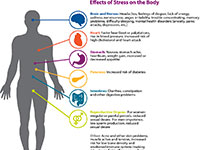


Sleep, Stress and Resiliency
Sleep Hygiene
Sleep hygiene is a variety of different practices that are necessary to have normal, quality nighttime sleep and full daytime alertness.
Why is sleep hygiene important?
Sleep is critical for people of all ages...from childhood to adulthood we all need sleep to function properly. Good sleep promotes daytime alertness and a positive sleep regimen. Healthy sleep hygiene can also prevent sleeping disorders or problems.
Examples of Good Sleep Hygiene
- Avoid caffeine, stimulants, nicotine or alcohol before bedtime
- Avoid eating before bedtime - stay away from big meals before sleeping as it disrupts your sleep habits; not the prime time to experiment with spicy dishes
- Light exercise before bed - Yoga is a great relaxing and calming exercise before bed. Vigorous exercises such as running and weight lifting should be done in the morning or late afternoon.
- Schedule a regular bedtime - your body becomes adjusted to the time set for bed
- Napping during the day - power naps are usually 20-30 minutes; avoid napping during the day as it may disturb normal sleeping pattern and wakefulness
- Make your bed a "domain of sleep" - avoid watching TV or other activities in your bed; the bed is made for you to lay in it and sleep (or sexual activity)
Learn More
Did You Know?
- The average student goes to bed between midnight and 2 a.m.
- 20-30 minute naps are good for performance; longer naps may disrupt your sleep patterns...so nap early in the day!
- Alcohol use is a risk factor, as it slows down the body but can cause arousal in the second half.
- 18-24 year old drivers have a higher risk of late-night crashes due to drowsiness or fatigue.
- There is such a thing as "too much sleep." Seven to nine hours is the recommended amount of sleep per day. Anything less is not enough...anything more is too much.
- A lack of sleep can lead to decreased GPA and academic performance.
- A lack of proper rest may lead to obesity and weight gain.
- A lack of sleep can lower your immune system's ability to respond, which opens your body up to colds, flu and sore throats more frequently.
Resources
Stress
Symptoms of Stress
- Change in eating patterns
- Lack of sleep/change in sleep patterns
- Increased Irritability
- Tense and increased muscle aches
- Increased anger or frustration
- Consistently pressed for time
» Learn more about coping with stress by reading the lyrics of La Di Da by Asher Roth
Resources
- Mental Health America
- Half of Us (MTV U and The Jed Foundation)
- Think About It
- Sleep Brochure by The WELL Team
Resiliency
Merriam-Webster defines resilience as "an ability to recover from or adjust easily to misfortune or change."